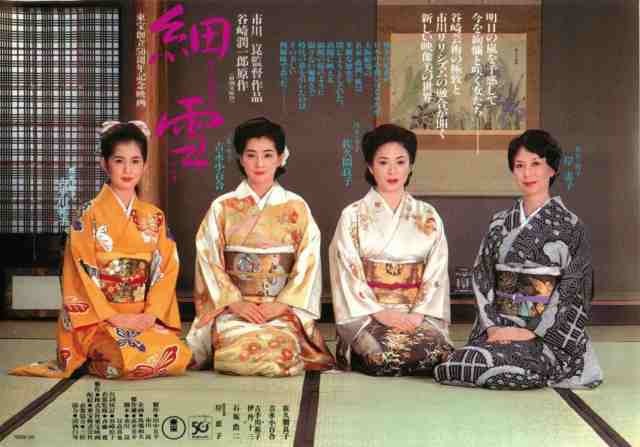Kon Ichikawa's "The Makioka Sisters" trades on alot of the same sentiments that made Ozu such a beloved figure in international cinema. It's a film that concerns itself primarily with the task of finding suitable husbands for two of the 4 titular sisters... something that drove so many of Ozu's efforts about the nuclear family and its important formation. And while Ozu deserves his place in the echelon, Ichikawa has worked a bit more in the margins and toggled through all types of genre. And while no one is going to accuse him of stepping on Ozu's toes in subject matter, in my opinion, "The Makioka Sisters" is better than anything ever produced by him.
Genuinely humane and bitingly funny, "The Makioka Sisters" does involve four of them, but it eventually narrows its view on the two youngest- indecisive but independent Yukiko (Sayuri Yoshinaga) and volatile, brash Taeko (Yuko Kotegawa). The two older sisters Sachiko (Yoshiko Sakuma) and Tsuruko (Keiko Kishi) spend most of their days trying to find suitors for both, but the film underlines something deeper than arranged marriages. That the Makioka family is well off (but often not as important as the male suitor's families lined up) is a central theme, but as the film travels in years after its starting point of 1938, their family declines. Add to that young Taeko runs off with a bar owner when her real love dies a peasant's death because he couldn't get surgery in time and Yukiko demures any advances from any established suitor, and Ichikawa's adaptation makes a strong case that the family is far more liberal and free spirited than the aristocratic frame they're often poised within. They want to conform, but young Yukiko and Taeko certainly have other ideas.
Full of wonderful, quickly edited reaction shots (mostly from the family's help in young Oharu played by Yukari Uehara) and a dinner meeting that carefully frames everyone in uncomfortable banter, "The Makioka Sisters" is also one of Ichikawa's most humorous efforts. Listening to a suitor ramble on about his work in aquatic reproduction and then hearing Yukiko turn him down with "I'm not a fish" gently underscores the admiration that slowly builds for these four women throughout the film. They have personalities. They grow on us like an expansive intimate epic should. And the slow puncture of Japanese cultures and mores feels like something revolutionary in the hands of a master director like Ichikawa.
Released in 1983, "The Makioka Sisters" (only 1 of his 93 films spanning from the late 30's until 2006) also uses color brilliantly. From a face bathed in red light inside a photography production room to the sickly green hue of a corner bar, it's a film that sees a purpose in each designation. Of course, there's the obligatory cherry blossoms as well. In a scene that bookends the opening and closing images, time has passed and life has been altered. But luckily, there's no great sadness. No one has died and the world is still spinning, although Yukiko and Taeko are at vastly different paths in their lives. And even though some melancholy has settled, "The Makioka Sisters" proves that even minor shifts can have tremendous impact.

No comments:
Post a Comment